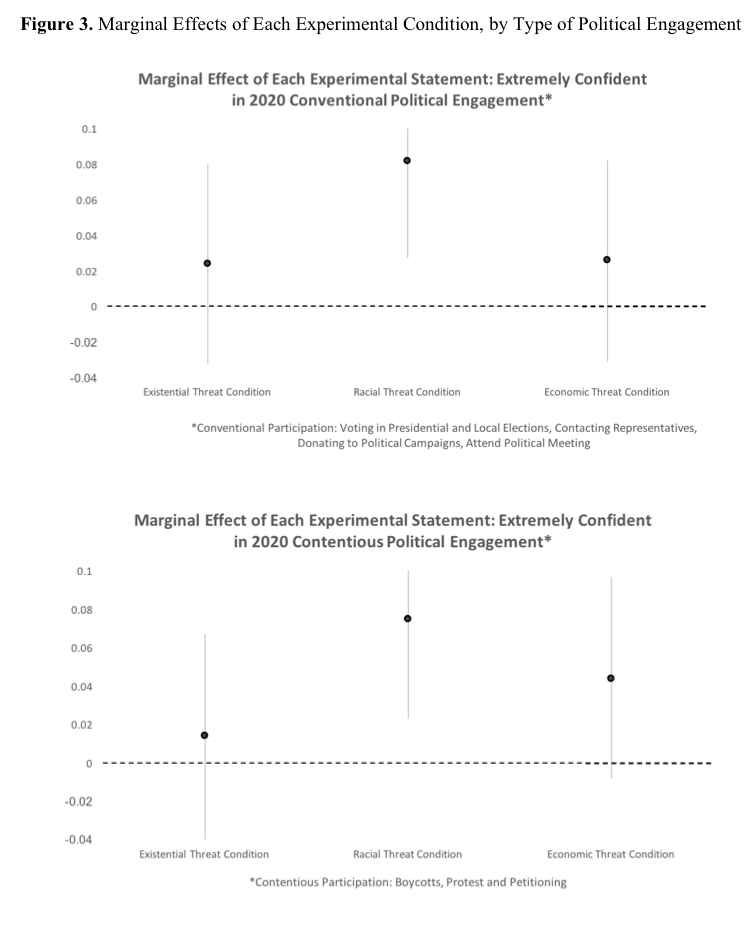The Racial Threat of Donald Trump: Results from an Original Survey Experiment
As Democrats consider whether they should appeal to the political center, or more specifically white “middle America”, the National Black Voter Project (BVP) offered an opportunity to explore how such strategies might affect the likelihood of engaging the African American community. In other words, if the choice must be made between campaigns highlighting issues of race, or class, strategy will achieve the most success at turning out the black community to vote?
We took the opportunity with the 2019 National Black Voter Project (BVP) to build on research that used the 2017 BVP Pilot Study to explore the relationship between the threatening context of Donald Trump’s presidency and African American political engagement. Prior research suggests that the threat of Donald Trump’s presidency is a significant predictor of black political engagement, both traditional/conventional and non-traditional/contentious forms of engagement, leading up to the 2018 Midterm Elections. Using the 2019 National BVP study, we not only confirm the previous findings in the lead-up to the 2020 general election, but also use an original survey experiment to test what type of threat – racial, existential or economic – offers the most mobilizing power.
To start, using the 2019 BVP data, we reconfirm earlier findings that the threat of Donald Trump’s presidency is significantly associated with political engagement. Figure 1 presents the relationship between responses to whether or not a respondent agreed with the statement: “Donald Trump’s presidency is destroying American,” and scales for confidence in participating in both conventional political engagement (i.e. voting, contacting a representative, donating to a political campaign, and attending a political meeting [α=0.72]) and contentious political engagement (i.e. boycotting, petitioning, and protesting [α=0.79]) during the 2020 election cycle. When it comes to confidence in conventional political engagement, a ten-point gap separates respondents who “strongly agree” Trump’s presidency is destroying the country, and an eight-point gap similarly separates respondents when evaluating confidence in contentious forms of engagement.
Digging deeper, we employed an original survey experiment to explore how specific types of perceived threat associated with Trump’s presidency might influence respondents’ likelihood of engaging in political activism in 2020.
To do so, we employed three experimental frames as messages about the threat Trump poses and the appropriate response needed from the Democrats. The three message frames each discussed threat and response different, framing the threat of Trump and the needed responses as one that emphasized a threat to racial progress, one that emphasized a threat to American democracy at-large, and one that emphasized an economic threat to the working class, as well as a control group who received no message at all (the full message frames are available in the questionnaire downloadable here). Each message frame was then followed by a battery of questions assessing subjects confidence in various acts of political engagement during the 2020 elections season.
Figure 2 presents the relationship between each of the message frames, as well as the control, and both conventional and contentious political participation. Relative to the control condition, only the frame emphasizing Trump as racist and a threat to racial progress has any meaningful (i.e., statistically significant) impact on the likelihood of political engagement in 2020.
Furthermore, the relationships between the racial threat message frame and both conventional and contentious political engagement remains after adjusting for various political and socio-demographic factors in a multivariate model setting (i.e. gender, age, income, education, region, ideology, partisanship, attitudes toward Trump and 2016 voter participation). Figure 3 presents the marginal effects from ordered logistical regression results predicting first conventional, and then contentious political engagement. Here, the racial threat message frame is the only message frame to offer effects significantly different from zero – or, any useful power as a mobilizing message at all.
In summary, our survey experiment suggests that any move away from a message describing Donald Trump as a racist and a threat to racial progress risks African American engagement. More specifically, if Democrats are to count on high levels of black political engagement for victories similar to 2008 and 2012, campaign messaging about Trump should be framed in a way that describes Trump as a racial threat as victories in the 2020 general election may depend on it.


